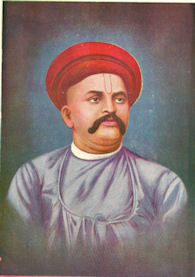

Mit den Auflösungen nach dem "Key" neu herausgegeben von Alois Payer
Zitierweise | cite as:
Apte, Vaman Shivaram <1858 - 1892>: The student's guide to Sanskrit Composition (Being a treatise on Sanskrit Syntax). -- 3. ed. -- 1890. -- 15. Lesson XV. -- Fassung vom 2010-04-09. -- URL: http://www.payer.de/apte/apte15.htm
Ursprünglich erschienen als:
Apte, Vaman Shivaram <1858 - 1892>: The student's guide to Sanskrit composition : being a treatise on Sanskrit syntax ; for the use of schools and colleges. -- 3rd ed. -- Poona : R. A. Sagoon, 1890. -- 450 S.
A Key to Apte's Guide to Sanskrit composition : giving a close rendering into English and Sanskrit of all the Sanskrit and English sentences / compiled by an experienced graduate teacher. -- 2d ed. -- Bombay : Standard Pub., 1923. -- 136 p. ; 18 cm
Erstmals hier publiziert: 2010-04-09
Überarbeitungen:
©opyright: Public domain
Dieser Text ist Teil der Abteilung Sanskrit von Tüpfli's Global Village Library
Falls Sie die diakritischen Zeichen nicht dargestellt bekommen, installieren Sie eine Schrift mit Diakritika wie z.B. Tahoma.
Die Devanāgarī-Zeichen sind in Unicode kodiert. Sie benötigen also eine Unicode-Devanāgarī-Schrift.
Use of brackets:
<> = Apte`s own Notes (loc. cit. pp. 277ff.)
[] = A Key to Apte's Guide to Sanskrit composition : giving a close rendering into English and Sanskrit of all the Sanskrit and English sentences / compiled by an experienced graduate teacher. -- 2d ed. -- Bombay : Standard Pub., 1923. -- 136 p. ; 18 cm
{} = Notes by Alois Payer
§ 158. The indeclinable past participle, in Sanskrit, commonly called 'absolutive' or 'gerund', always denotes a prior action, or an action completed before another, and corresponds to the perfect participle, or the participle in ing having the sense of the perfect participle in English, as, प्रतीहारी समुपसृत्य सविनयमब्रवीत् (Kādambarī 6) 'the female door-keeper, drawing near or having drawn near, modestly said;' वैशंपायनो मुहूर्तमिव ध्यात्वा सादरमब्रवीत् (Kādambarī 18) 'Vaiśampāyana, as if contemplating for a moment, respectfully said.'
But in the sentence 'going to a village, he touches a blade of grasss on his way;' we must say, ग्रामं गच्छन् पथि तृणं स्पृशति.
§ 159. Indeclinable past participles in Sanskrit are formed by त्वा or by य (changed to त्य) when a preposition precedes a root (for rules, vide Dr. Kielhorn's Grammar1 §§ 513 - 525). They are, as before stated, used to denote a past or prior action, and must have the same agent as the main verb; as, तुरासाहं पुरोधाय धाम स्वायम्भुवं ययुः (Kumārasambhava II.1) 'having placed Indra at their head (the gods) went to the abode of Brahman'. Here the agent of 'placing' and 'going' is the same, and hence the geround can be used; but स तं हत्वाहमागच्छम् is wrong. In such cases the gerund cannot be used; the Locative absolute construction will have to be used to express the same sense, as, तस्मिंस्तेन हते ऽहमागच्छम्. So, सर्वैः पशुभिर्मिलित्वा सिंहो विज्ञप्तः (Hitopadeśa 2) 'the lion was entreated by all the beasts, having assembled together;' स एनं दोषं प्रख्याप्य नगरान्निवास्यताम् (Mudrārākṣasa 1) 'let him be expelled the city (by thee) having proclaimed this crime.'
{1 Kielhorn, Franz <1840-1908>: A grammar of the Sanskrit language. -- 3d ed., revised and enlarged -- Bombay, Government Central Book Depôt, 1888. -- xiv, 286 p. : 25 cm. -- Online: http://www.archive.org/details/agrammarsanskri00kielgoog. -- Accessed on 2010-03-11}
§ 160. The Sanskrit gerunds are very useful to economize the use of conjunctions and verbal forms in describing or narrating events. In translating constructions introduced by 'after having,' 'when' or 'after'; 'when', 'after' &c. nedd not be translated, the gerund of the verb being alone used; as, रावणं हत्वा 'after having killed Rāvaṇa'; 'when he went there, he did not find anything' स तत्र गत्वा न किमपि लेभे.

Abb.: रावणं हत्वा ...
Fernand Cormon (1845 - 1924): Mort de Ravana (Death of Rāvaṇa), 1875
An English sentence containing several clauses introduced by 'having' would look awkward; but in Sanskrit several gerunds can be strung together to express those ideas which would be expressed in English by a verbal tense and the copulative conjunction; as, मां रुधिरेणालिप्य वृक्षस्याधः प्रक्षिप्य गम्यतां पर्वतमृष्यमूकं प्रति (Pañcatantra III) 'having besmeared me with blood, and thrown me under the tree, go to the mountain Ṛyamūka,' i.e. besmear me &c. and go &c.; अथ स ब्राह्मणस्तं पशुं राक्षसं मत्वा भयाद्भूमौ प्रक्षिप्य दैवं निर्भर्त्य गृहमुद्दृश्य प्रस्थितः (Hitopadeśa 4) 'then the Brāhmaṇa, thinking the beast to be a demon, threw it on the ground with fear, and censuring Fate, set off for his home.' When there are copulative assertions in English, the gerunds may be conveniently used in translating them into Sanskrit.
Obs. The natural sequence of events must be observed in the use of these gerunds; as, पक्त्वा भुक्त्वा स्वपिति 'having cooked and taken his food he sleeps'; but not भुक्त्वा पक्त्वा स्वपिति.
§ 161. Some Sanskrit gerunds may often have the sense of prepositions and prepositional phrases; as मुक्त्वा 'except', आदाय 'with'. उद्दिश्य 'towards', अधिकृत्य 'with reference to.'
§ 162. There is another kind of gerund in Sanskrit formed by the addition of अम् immediately to the root or derivative base, and making the same changes as before the इ of the passive Aorist (see Dr. Kielhorn's Grammar1 § 526); as, क्षेपं 'having thrown' from क्षिप्; वादं 'having spoken'; भोजं 'having dined'.
{1 Kielhorn, Franz <1840-1908>: A grammar of the Sanskrit language. -- 3d ed., revised and enlarged -- Bombay, Government Central Book Depôt, 1888. -- xiv, 286 p. : 25 cm. -- Online: http://www.archive.org/details/agrammarsanskri00kielgoog. -- Accessed on 2010-03-11}
§ 163. When this gerund is repeated, it denotes a repetition or recurrence of the action or state expressed by the root, as, स्मारं स्मारं नमति शिवं (Siddhāntakaumudī) 'having often and often called to mind Śiva, he bows to him;' कलिंगनाथो मयि बद्धवैर इति श्रावं श्रावं चंडवर्मा युद्धायोद्यतो बभूव (Daśakumāracarita II.3) 'having repeatedly heard that the lord of the Kaliṅgas was hostilely inclined towards himself, Caṇḍavarman became ready to fight'; so also, पायं पायं, दर्शं दर्शं 'having repeatedly drunk or seen.'
§ 164.1 With the words अग्रे, प्रथमं and पूर्वं this gerund or the ordinary one in त्वा is used; as, अग्रे - प्रथं - पूर्वं वा भोजं - भुक्त्वा वा व्रजति 'having first eaten he goes.'
1 विभाषाग्रेप्रथमपूर्वेषु । (Pāṇini III.4.24) {'The affixes क्त्वा and णमुल् come optionally after that verb which denotes the prior action, when both verbs have the same agent, provided that the following words are in composition: - अग्रे, प्रथम and पूर्व.' Transl. Vasu, 1891}
(a)1 With the words अन्यथा, एवं, कथं, and इत्थं this gerund of कृ 'to do' is used, provided the whole word thus formed retains the same meaning as the words themselves; as, एवंकारं भुंक्ते (Siddhānatakaumudī) 'he eats thus'; कथंकारं भुंक्ते 'in what manner does he eat'; but शिरो न्यथा कृत्वा भुंक्ते ['he eats turning away his head'].
1 अन्यथैवंकथमित्थंसु सिद्धाप्रयोगश्चेत् । (Pāṇini III.4.27) {'When the words अम्यथा (otherwise), एवम् (so), कथम् (how) and इत्थम् (thus) are compounded with the verb, then णमुल् comes after कृ (to make), if it be such that its omission would be unobjectionable.' Transl. Vasu, 1891}
(b)1 With the words यथा, तथा, when angry reply is given; as, तथाकारं भोक्ष्ये तवानेन (Siddhāntakaumudī) 'I will eat that way; what have you to do with it?'
1 यथातथयोरसूयाप्रतिवचने । (Pāṇini III.4.28) {'The affix णमुल् is added to the root कृ (to make), the words यथा and तथा being compounded with it, when an angry reply is made : (if the omission of कृञ् is unobjectable).' Transl. Vasu, 1891}
§ 165.1 With the words 'sweet' or 'seasoned' this gerund of कृ is used; as, स्वादुंकारं - लवणंकारं भुंक्ते 'he eats, having made his food sweet or seasoned.'
1 स्वादुमि णमुल् । (Pāṇini III.4.26) {'(When the actions signified by the verbs कृ and another, have the same agent), the affix णमुल् is added to the verb कृ (which is concerned about a time anterior to that of the other), provided that a word signifying 'sweet' is in composition.' Transl. Vasu, 1891}
§ 166.1 In the case of the roots दृश् and विद् 'to know', this gerund is joined with their object to denote the whole or collection of that object; as, कयादर्शं वरयति (Siddhāntakaumudī) 'he chooses as many girls as he sees'; i. e. all the girls seen; ब्राह्मणवेदं भोजयति 'he feeds as many Brāhmaṇas he knows', i. e. all.
[Key: ब्राह्मणवेदं - यं यं ब्राह्मणं जानाति विचारयति वा तं सर्वं भोजयतीत्यर्थः ।]
1 कर्मणि दृशिविदोः साकल्पे । (Pāṇini III.4.29) {'When the object is compounded with it, the verb दृश् (to see), or विद् (to know) takes the affix णमुल्, to denote the total number of such objects.' Transl. Vasu, 1891}
(a)1 विद् 'to get' and जीव् 'to live' are combined with यावत् in the same sense; as, यावद्वेदं भुंक्ते 'he east as much as he gets'; यावज्जीवमधीते 'he studies as long as he lives' i. e. throughout his life.
1 यावति विन्दजीवोः । (Pāṇini III.4.30) {'The affix णमुल् comes after the verb विद् (to get) and जीव् (to live), when the word यावत् is combined with them.

Abb.: यावज्जीवमधीते
महामहोपाध्ययो विद्यावचस्पतिः पद्मश्री सत्यवतः शास्त्री (१९३० - )
(b)1 With the words चर्मन् and उदर this gerund of पूर् is used with the object; as, उदरपूरं भुंक्ते 'eats as so to fill his belly'; so चर्मपूरं स्तृणाति 'spreads as to cover the skin.'
चर्मोदरयोः पूरेः । (III.4.31) {'The affix णमुल् comes after the verb पूर् (to fill), when the words चर्मन् and उदर are compounded with it as object.' Transl. Vasu, 1891}
§ 167.1 With the words शुष्क, चूर्ण, and रूक्ष this gerund of पिष् is used like the cognate accusative in English; i. e. the gerund of the root and the root itself are used to signify the sense denoted by the root; as, चूर्ण्पेषं पिनष्टि 'he grinds something till it is reduced to powder', i. e. he grinds it to powder; so शुष्कपेषं पिनाष्टि ['pounds a thing dry'], रूक्षपेषं पिनाष्टि.
1 शुष्कचूर्णरूक्षेषु पिषः । (Pāṇini III.4.35) {'The affix णमुल् comes after the verb पिष् (to grind) when the 1words शुष्क (dry), चूर्ण (powder), and रूक्ष (dry), in the accusative case are compounded with it.' Trans. Vasu, 1891}
(a)1 With the words समूल, अकृत, जीव, the roots हन्, कृ and ग्रह् are respectively used in a cognate sense; as, समूलघातं हन्ति 'he destroys so as to tear up by the roots,' i. e. he totally extirpates; अकृतकारं करोति 'he does a thing which was not done before'; तं जीवग्राहं गृह्णाति 'captures him so as to preserve his life', i.e. captures him alive.
1 समूलकृतजीवेषु हन्क्ऋञ्ग्रहः । (Pāṇini III.4.36) {'The affix णमुल् comes after the verbs हन् (to kill), कृ (to make) and ग्रह् (to seize), when the words समूल, अकृत and जीव in the accusative case are respectively compounded with them.' Transl. Vasu, 1891}
(b) In the same way this gerund of हन् and पिष् is used with a noun to denote that it is the instrument of the action; as, पादघातं हन्ति = पादेन हन्ति 'he strikes with the foot;' उदपेषं पिनष्टि = उदकेन पिनष्टि 'he grinds with water'; similarly, तं हस्तग्राहं गृह्णाति 'he takes him by the hand'; so पाणिग्राहं, करग्राहं &c. हस्तवर्तं वर्तयति = हस्तेन &c. Other examples are: - जीवनाशं नश्यति 'perishes so that his life perishes', i. e. dies away; ऊर्ध्वशोषं शुष्यति वृक्षः 'the tree is tried up while it is still standing'; so ऊर्ध्वपुरं पूर्यते.

Abb.: ऊर्ध्वशोषं शुष्यन्ति वृक्षाः ।
महाराष्ट्रे
[Source: Harshad Sharma. --
http://www.flickr.com/photos/harshadsharma/7602427/. -- Downloaded on
2010-03-30. --
Creative
Commons License (attribution, no commercial use, no derivative work)]
§ 168.1 Sometimes this gerund is used to denote similitude or likeliness, such as would be ordinarily expressed by इव; as, अजनात्शं नष्टः 'he perished like a goat'; पार्थसंचारं चरति 'he walks like Pārtha'; घृतनिधानं निहितं जलं 'water was kept as ghee (would be kept).'
1 उपमाने कर्मणि च । (Pāṇini III.4.45) {'The affix णमुल् comes after a root, when an object or an agent, denoting similitude, is in composition with it.' Transl. Vasu, 1891}
§ 169.1 Roots having the sense of हिंस् 'to strike', such as हन्, तड् &c. are used in this gerundive form with nouns, when the object of this gerund is the same as the object of the main verb, and when the noun with which it is compounded would have stood in the instrumental case if the ordinary gerund has been used; as, दण्डोपघातं गाः कालयति 'he collects together the cows, beating (them) with a club.'
1 हिंसार्थानां च समानकर्मकाणाम् । (Pāṇini III.4.48) {'The affix णमुल् comes after roots having the sense of हिंस् (to strike), when the object of this gerund is the same as the object of the main verb, and when the noun with which it is compounded ends with the third case-affix.' Transl. Vasu, 1891}

Abb.: दण्डोपघातं गाः कालयति
Imphal - ইম্ফল
[Source:
ZeHawk. --
http://www.flickr.com/photos/lastgunslinger/3263518345/. -- Downloaded on
2010-03-31. --
Creative Commons License (attribution, no derivative work)]
(a) Similarly वजोपरोधं गाः स्थापयति 'he stations the cows so that they are all in the fold'; पार्श्वोपपीडं शेते = पार्श्वाभ्यामुपपीडयन् &c.
(b) ग्रह् is joined wizh हस्त, केश and words having the same sense, when immediate contiguity is intended; as, केशग्राहं युध्यन्ते 'having closely caught (each other) by the hair they fight' (= केशेषु गृहीत्वा). Also हस्तग्राहं = हस्तेन गृहीत्वा; यष्टिग्राहं 'taking a stick' (यष्टिं गृहीत्वा); so लोष्टग्राहं {'taking a clod'}.
§ 170.1 With words signifying 'limbs of one's own body' this gerund is used, when the limb is not kept steady; as, भ्रूविक्षेपं कथयति (वृत्तान्तं) 'he narrates (the account), throwing his eyebrows (glances) about in all directions.'
1 स्वाङ्गे ऽध्रुवे । (Pāṇini III.4.54) {'The affix णमुल् comes after a root, when a word in the Accusative case is in composition, signifying the limbs of one's body, when the limb is such that its loss will not destroy life.' Transl. Vasu, 1891}
(a)1 In the same way when a part of the body is completely hurt or afflicted in the action, this gerund is used with that part in the sense of the Accusative; as, उरःप्रतिपेषं युध्यन्ते 'they fight so as to afflict their whole bosom' (कृत्स्नमुरः पीडयन्तः); स्तनसंबाधमुरो जघान (Kumārasambhava IV.26) 'and she struck her bosom so as to hurt her breasts.'
1 परिक्लिश्यमाने च । (Pāṇini III.4.55) {'The affix णमुल् comes after a root, when a word in the Accusative case denoting a limb of one's own body, which is completely afflicted by the action, is in composition.' Transl. Vasu, 1891}
§ 171.1 The roots दिश् with आ and ग्रह् are joined in their gerundive form with नामन् in the sense of the Accusative; as, नामादेशमाचष्टे 'he mentions (it) telling his name'; नामग्राहं मामाह्व्यति 'he calls me by taking my name' (i. e. by my name).
1 नाम्न्यादिशिग्रहोः । (Pāṇini III.4.58) {'The affix णमुल् comes after the roots आ-दिश् and ग्रह्, when the word नामन् (name) in the Accusative is in composition.' Transl. Vasu, 1891}
Obs. This gerund is used with nouns to form compound words; as, ब्राह्मणवेदं, not ब्राह्मणान् वेदं; जीवग्राहं, not जीवं ग्राहं &c.
स दुष्टाशयो बकः क्रमेण तान्पृष्ठमारो्प्य जलाशयस्य नातिदूरे शिलां समासाद्य तस्यामाक्षिप्य स्वेच्छया भक्षयित्वा मुयो ऽपि जलाशयं समासाद्य जलचराणां मिथ्यावार्तासंदेशकैर्मनांसि रञ्जयन्नाहारवृत्तिमकरोत् ॥१॥ (Pañcatantra I.7)
<Notes: मिथ्यावार्तासंदेशकैः 'by false accounts and messages.'>
[Key: दुष्टः आशयः thought, intention यस्य । जलस्याशयः reservoir of water, a tank. मिथ्या वार्ताश्च संदेशकाश्च तैः । आहोरस्य वृत्तम् ।
That wicked crane made them mount his back by turns, and having gone to a stone not far from the tank, dashed them against it, ate them at pleasure and coming back to the tank delighted all the aquatic creatures with false news and and messages and thus maintained himself.]
{बकः = a generic term for all Ciconiidae (stork), Threskiornithidae (ibis), and Ardeidae (heron), especially
- Leptoptilos dubius - Adjutant Stork (Greater Adjutant)
- Threskiornis aethiopicus - White Ibis
See: Dave, K. N. <1884 - 1983>: Birds in Sanskrit literature. -- Delhi : Motilal Banarsidass, 1985. -- XXIV, 481 S. : Ill. -- ISBN 0-89581-676-8. -- p. 503f.}

Abb.: बकः - Leptopilos dubius Gmelin -
Adjutant Stork
[Source: Haplochromis / Wikimedia commons. --
Creative Commons
License (attribution, share alike)]

Abb.: बकः -
Threskiornis aethiopicus Latham - White Ibis
[Source: IvanTortuga
/ Wikimedia commons. --
Creative Commons
License (attribution)]
ततो भ्रातृशरीरमग्निसात्कृत्वा पुनर्नवीकृतवैधव्यदुःखया मया त्वदीयं देशमवतीच्॥२॥ (Mālavikāgnimitra 5)
[Key: निर्गतो धवो यस्याः सा विधवा तस्या भावो वैधव्यं । तस्य दुःखं वैधव्यदुःखं ; नवीकृतं वैधव्यदुःखं यस्याः सा तया ।
I then consigned the body of my brother to fire and with my pain of widowhood rendered fresh again, came to your country and became an ascetic (lit. took this two reddish-brown garments).]

Abb.: मयेमे काषाये गृहीते ।
काठमांडौमहानगरे
[Source: calamur. --
http://www.flickr.com/photos/gargi/3011198638/. -- Downloaded on 2010-04-01.
-- Creative
Commons License (attribution, no commercial use, no derivative work)]
प्रवृत्ते प्रदोषसमये च्रन्द्रापीदश्चरणाभ्यामेव राजकुलं गत्वा पितुः समीपे मुहूर्तं स्थित्वा दृष्ट्वा च विलासवतीमागत्य स्वभवनं शयनतलमधिशिश्ये ॥३॥ (Kādambarī 98)
[Key: Then at the approach of the evening Candrāpīḍa went, just on foot, to the palace, stayed for a short while near his father, saw Vilāsavatī and returning to his abode, lay down foe rest on a couch.]
ते
हिमालयमामन्त्र्य पुनः प्राप्य च शूलिनम् ।
सिद्धं चास्मै निवेद्यार्थं तद्विसृष्टाः खमुद्ययुः ॥४॥ (Kumārasambhava VI.94)
[Key: Having taken leave of Himālaya they came back to Śiva and telling him that the object was accomplished, flew up into the sky, being permitted to depart by Him.]
अहं येनेष्टिपशुमारं मारितः सो ऽनेन स्वागतेनाभिनन्द्यते ॥५॥ (Śakuntalā 6)
<Notes: इष्टिपशुमारं मारितः 'slaughtered like a sacrificial victim.' सः = मातलिः.>
[Key: He, by whom I was heckled like a sacrificial victim, is greeted by him with words of welcome!]
सा कुबेरभवनान्निवर्तमाना समापत्तिदृष्तेन केशिना दानवेन चित्रलेखाद्वितीया बन्दिग्राहं गृहीता॥६॥ (Vikramorvaśīya I.)
<Notes: चित्रलेखाद्वितीया 'having Citralekhā for her companion.'>
[Key: समापत्या दृष्टः समापत्तिदृष्टः । चित्रलेखा द्वितीया यस्याः ।
She, while returning from the abode of Kubera, was taken (in the manner of a) captive, along with Citralekhā, by the demon Keśin who was seen accidentally.]
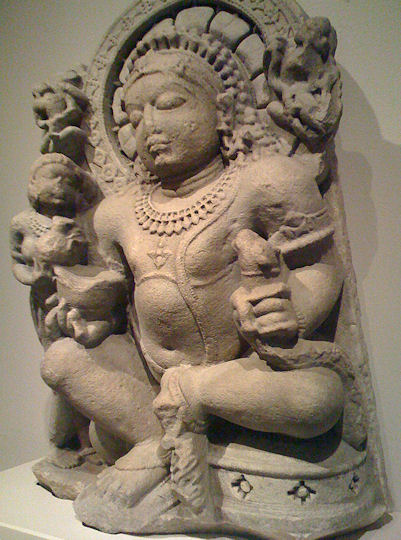
Abb.: कुबेरः
10th century
[Source: Zereshk / Wikipedia. -- GNU FDLicense]
मगधराजः प्रक्षीणसकलसैन्यमण्डलं मालवराजं जीवग्राहमभिगृह्य दयालुतया पुनरपि स्वराज्ये प्रतिष्ठापयमास ॥७॥ (Daśakumāracarita I.1.)
[Key: प्रक्षीणं destroyed सकलं सैन्यमण्डलं यस्य ।
The King of Magadha captured alive the king of Mālava, the whole of whose army was routed, but through his kindliness set him again on his throne.]
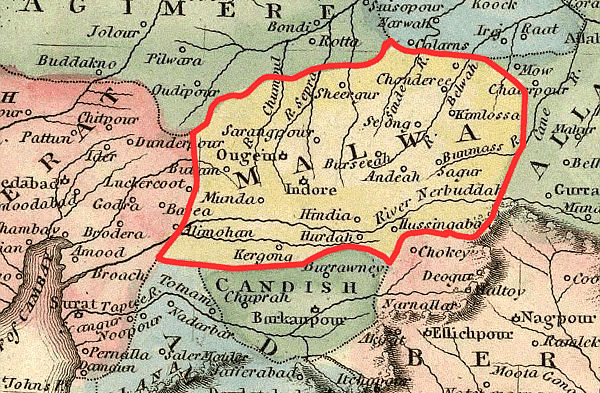
Abb.: मालवः
Historical map of India by Fielding Lucas Jr. (1823).
मत्तकालो नाम लाटेश्वरो वीरकेतोस्तनयां वामलोचनां नाम तरुणीरत्नप्रसामान्यलावण्यं श्रावं श्रावमवधूतदुहितृप्रार्थनस्य तस्य पाटलीं नाम्न नगरीमरौत्सीत् ॥८॥ (Daśakumāracarita I.3)
[Key: वामे beautiful लोचने यस्याः सा वामलोचना । तरुणीषु रत्नमिव तरुणीरत्नम् । न सामान्यमसामान्यं लावण्यं यस्य तत् । अवधूता दुहितुः प्रार्थना येन ।
The king of the Lāṭa country, named Mattakāla, having again and again heard that Vāmalocanā, the daughter of Vīraketu, was a jewel among young maidens and of uncommon beauty, besieged his (Vīraketu's) capital, Pāṭalī by name, as he rejected his suit for her.]
अनन्तरं सूत्र्धारो दारुवर्मा वैरोधकपुरःसरैः पदातिलोकैर्लोष्टघातं हतः ॥९॥ (Mudrārākṣasa 2)
[Key: Then the carpenter Dāruvarman was pelted to death by the footmen headed by Vairodhaka. (वैरोधकः पुरःसरो येषां तैः).]
संप्राप्य
राक्षससभां चकन्द क्रोधविह्वला ।
नामग्राहमरोदीत्सा भ्रातरौ रावणान्तिके ॥१०॥ (Bhaṭṭikāvya V.5)
<Notes: क्रोधविह्वला scil. शूर्पणखा. भ्रातरौ = Khara and Dūṣaṇa.>
[Key: क्रोधेन विह्वला ।
She, overpowered by anger, went to the court of the Rākṣasas and cried aloud; she then mourned (the loss of) her two brothers before Rāvaṇa.]
लतानुपातं कुसुमान्यगृह्णात्स
नद्यवस्कंदमुपास्पृशच्च ।
कुतूहलाच्चारुशिलोपवेशं काकुत्स्थ ईषत्स्मयमान आस्त ॥१॥ (Bhaṭṭikāvya V.11)
<Notes: लतानुपातं 'repeatedly bending down the creepers.' नद्यवस्कंदं &c. - 'would sip water, troubling the (waters of) rivers.' चारुशिलोपवेशं 'seating himself on some charming rock.'>
[Key: लतामन्पात्यानुपात्य लतानुपातम् । नदीमवस्कन्द्यावस्कन्य । चारुषु शिलासु उपविश्योपविश्य ।
... Through curiosity he, the descendent of Kakutstha (Rāma), repeatedly culled flowers, bending down creeper after creeper, wading through every river, touched and sipped its water and sat down smiling gently on every beautiful stone-slab (he came across). 'Smiling gently' may also be taken with each clause.]
{ककुत्स्थः = member of the Ikṣvāku-dynasty, son of Bhagīratha, father of Raghu.}
स्नेहात्स भाजयितुमेत्य
दिनान्यमूनि
नीत्वोत्सवेन जनको
ऽद्य गतो विदेहान् ।
देव्यास्ततो विमनसः परिसान्त्वनाय
दर्मासनाद्विशति वासगृहं नरेन्द्रः ॥२॥ (Uttararāmacarita 1)
[Key: Janaka, having come here out of affection to great (Rāma) and passed so many years in festivities, has gone back to Videha today. And the king (Rāma), leaving his judgement-seat, is entering the inner appartement to soothe the queen disconsolate (विगतं मनो यस्याः सा तस्याः) on that account.]
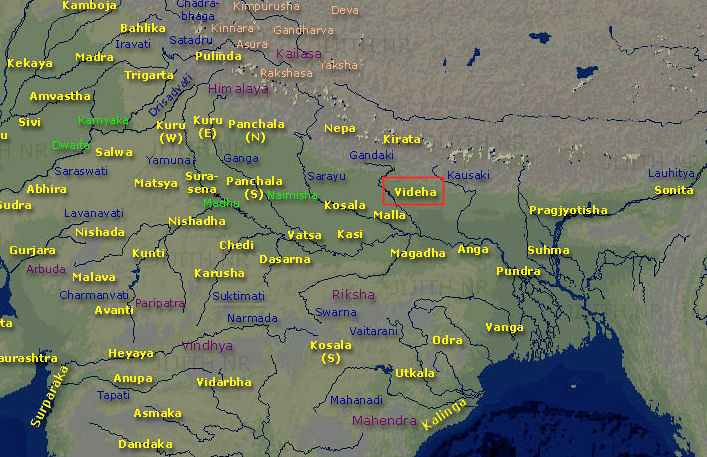
Abb.: विदेहाः
[Source: JIJITH NR / Wikipedia. -- GNU FDLicense]
विश्वासप्रतिपन्नानां वञ्चने का विदग्धता ।
अंकमारुह्य सुप्तं हि हत्वा किं नाम पौरुषम् ॥३॥ (Hitopdeśa 4)
<Notes: विश्वासप्रतिपन्नानां 'who have entered into confidence,' who repose confidence.>
[Key: विश्चासं प्रतिपन्नाः विश्वासप्रतिपन्नाः तेषाम् ।
What cleverness is there in deceiving those who have reposed confidence ? What kind of valor is that if one kills one who has gone to sleep after resting on the lap ?]
तामिन्दुसुन्दरमुखीं सुचिरं विभाव्य
चेतः कथं कथमपि व्यपवर्तते मे ।
लज्जां विजित्य विनयं विनिवार्य धैर्यम्
उन्मथ्य मन्थरविवेकमकाण्ड एव ॥४॥ (Mālatīmādhava 1)
<Notes: 'Overcoming (all sense of) shame, warding off decorum, and at once rooting out strength of mind.' मन्थरविवेकं 'slow in (forming) judgement.'>
[Key: इन्दुरिव सुन्दरं मुखं यस्याः सा ताम् । मन्थरो विवेक यस्य तत् । Construe - मम चेतः अकाण्ड एव मन्थरविवेकं सत् लज्जां विजित्य ..... तामिन्दुसुन्दरमुखीं सुचिरं विभाव्य कथं कथमपि विनिवर्तते ।
Having long dwelt on her, with a face lovely like the moon, my heart, which has suddenly (अकाण्डे lit. at an improper time) overcome shame, set aside modesty, uprooted fortitude and got its power of discrimination blunted, turns back (from her) with difficulty.]
श्रुत्वा वार्तां
जलदकथितां तां धनेशो
ऽपि
सद्यः
शापस्यान्तं सदयहृदयः संविधायास्तकोपः ।
संयोज्यैतौ विगलितशुचौ दंपती दृष्टचित्तौ
भोगानिटानविरतसुखं प्रापयामास शश्वत् ॥५॥ (Meghadūta 119)
<Key: जलदेन कथितां ; धन्स्येशः Kubera. सदयं हृदयं यस्य ; अस्तः कोपः यस्य ; विगलिता शुग् ययोस्तौ ; दृष्टं चित्तं यया ; अविरतं never ceasing सुखं येषु तान् । Construe - जलदकथितां तां वार्तां सदयहृदयः अस्तकोपः धनेशो ऽपि सद्यः शापस्यान्तं कृत्वा विगलितशुचौ दृष्टचित्तौ एतौ दम्पती संयोज्य अविरतसुखान् भोगान् शश्वत्प्रापयामास ।
On hearing the news told by the cloud (messenger), the tender-heared lord of wealth (Kubera), also, with his anger gone, at once put an end to the curse and united the couple (the Yakṣa and his wife) whose sorrow, thereupon, disappeared and who were delighted at heart, and made them enjoy pleasures, which never lost their flavor (lit. the happiness from which never ended - was continuous), for all times.]
निमित्तानि च
पश्यामि विपरितानि केशव ।
न च श्रेयो ऽनुपश्यामि
हत्वा स्वजनमाहवे ॥६॥ (Bhagavadgītā I.31)
[Key: I also see ominous signs, O Keśava! And I do not see any benefit accruing from our killing or kinsmen in battle.]

Abb.: न च श्रेयो ऽनुपश्यामि
हत्वा स्वजनमाहवे ॥
[Source: Ranveig / Wikipedia. --
Public domain]
-------------------------------------
राजवाहनो रसालतरुषु कोकिलादीनां पक्षिणामालापाज्श्रावं श्रावं विकसितानि सरांसि दर्शं दर्शममंदलीलया ललनासमीपमवाप ॥७॥ (Daśakumāracarita I.5)
<Notes: अमंदलीलया 'with graceful agility.'>
[Key: Rājavāhana repeatedly hearing the notes of the cuckoos and other birds in the mango-trees and again and again observing the sight of lakes with full-blown lotuses, came to the damsel with a sportively brisk gait.]
{कोकिलः = Eudynamys scolopaceus L. - Koel; also Cuculus canorus - European or Grey Cuckoo; Cuculus saturatus Blyth - Himalayan Cuckoo.
See: Dave, K. N. <1884 - 1983>: Birds in Sanskrit literature. -- Delhi : Motilal Banarsidass, 1985. -- XXIV, 481 S. : Ill. -- ISBN 0-89581-676-8. -- p. 491}

Abb.: कोकिलः -
Eudynamys scolopaceus L. - Koel
Kolkata -
কলকাতা,
West Bengal - পশ্চিমবঙ্গ
[Source: J. M. Garg / Wikimedia commons. -- GNU FDLicense]

Abb.: कोकिलः - Cuculus canorus L. -
European or Grey Cuckoo
[Source: Wikimedia commons. -- Public domain]

Abb.: कोकिलः -
Cuculus saturatus Blyth - Himalayan
Cuckoo
Taiwan - 臺灣
[Source: Hiyashi Haka. --
http://www.flickr.com/photos/hiyashi/3610097548/. -- Downloaded on
2010-04-09. --
Creative
Commons License (attribution, no commercial use, share alike)]
तेनैव दीपदर्शितेन विलपथेन गत्वा स्थिते ऽर्धरात्रे वासगृहं प्रविष्टो विश्रब्धप्रसुप्तं सिंहघोषं जीवग्राहमग्रहीषम् ॥८॥ (Daśkumāracarita II.4)
<Notes: स्थिते ऽर्धरात्रे 'when it was midnight.'>
[Key: दीपेन दर्शितः दीपदर्शितः ; विलस्य पन्थाः विलपथः विश्रब्धम् प्रसुप्तं विश्रब्धप्रसुप्तम् ।
Going by the same subterranean passage shown by means of a lamp, I entered the inner apartment, when it was midnight and captured Siṃhaghoṣa alive, when fast asleep, being without suspicion (sleeping unsuspectingly).]
तं विप्रद्रशं
कृतघातयत्ना यान्तं वने रात्रिचरी डुढौके ।
जिघांसुवेदं धृतभासुरास्त्रस्तां ताडकाख्यां निजघान रामः ॥९॥ (Bhaṭṭikāvya II.23)
<Notes: विप्रद्रशं कृतघातयत्ना 'who made an attempt at killing whomever she considered (saw) to be a Brāhmaṇa.' जिघांसुवेदं धृतभासुरास्त्रः 'who took resplendent missiles to kill whomsoever he knew to be murderous.'>
[Key: विप्रं दृष्ट्वा विप्रदर्शं । कृतो घाताय यत्नो यया । जिघांसुं विदित्वा जिघांसुवेदं । धृतं भासुरमस्त्रं येन । ताडका इत्याख्या यस्याः ताम् ।
A female night-stalker (demoness) who made an attempt to kill each and every Brāhmaṇa, she saw, attacked him as he passed through the forest. Rāma, on knowing her to be intent on killing, took up a bright missile and slew here whose name was Tāḍakā (or Rāma who always took up bright missiles whenever he know one to be intent on killing &c.).]
विद्युत्प्रणाशं
स वरं प्रनष्टो यद्वोर्ध्वशोषं तृणवद्विशुष्कः ।
अर्थे दुरापे किमुत प्रवासे न शासने ऽवास्थित यो गुरूणाम् ॥१०॥ (Bhaṭṭikāvya
III.14)
<Notes: Better that he dies or is dried up &c. who does not abide by his elders' order in the case of a difficult thing (to do which is an arduous duty) ; how much more so when he is told to travel abroad' (a comparatively easy task).>
[Key: विद्युदिव प्रन्ष्टः विदुत्प्रणाशः । ऊर्ध्वमेव शुष्यति ऊर्ध्वशोषं । Construe - दुरापे अपि अर्थे यो गुरूणां शासनं नावस्थितः स विद्युत्प्रणाशं प्रनष्टः वरं यद्वा &c. ।
Better he were destroyed (suddenly) like lightening or dried-up like grass while yet standing erect, who would not abide by the order of his elders (or father) even in matters difficult to be accomplished ; how much more so then in a matter like (so easy) going into exile or on a journey.]
यो नष्टानपि
जीवनाशमधुना शुश्रूषते स्वामिनस्
तेषां वैरिभिरक्षतः कथमसौ संधास्यते राक्षसः ।
इत्थं वस्तुविवेकमूढमतिना म्लेच्छेन नालोचितं
दैवेनोपहतस्य बुद्धिरथ वा पूर्वं विपर्यस्यति ॥११॥ (Mudrārākṣasa 6)
<Notes: Rākṣasa blames Malayaketu for suspecting his conduct without any ground. 'How' says he, 'did not occur to his mind that he, who even now served his masters' cause though they themselves were dead and gone, would not certainly ally himself with his professed enemies, so long as he lived safe and sound?'>
[Key: जीवो यया नश्यते तया जीवनाशं (so as to lose their life) । न क्षतः अक्षतः । वस्तुन्O विवेकः तत्र मूढा मतिर्यस्य तेन । Construe - यः जीवनाशं नष्टानपि स्वामिनः अधुना शुश्रूषते असौ राक्षसः अक्षतः सन् तेषां वैरिभिः कथं संधास्यते इति &c. ।
How will that Rākṣasa , who even now, serves (the cause of) his masters though dead and gone, ally himself with their enemies, himself undestroyed ? - of this the Mleccha, with his mind devoid of all sense of discrimination, did not think; or why, the intellect of a man doomed by fate becomes perverted first.]
All translations from the Key.
N. B.—Use participles for the words italicized.
1. Seeing the fowler coming towards them, all the animals becoming frightened, ran away in different directions.
लुब्धकमायन्तं दृष्ट्वा सर्वे पशवो भयाक्रान्ता भूत्वा कांदिशीकाः संवृत्ताः or सर्वासु दिक्षु पलायन्त - विद्रुताः &c. ॥१॥
2. When did you come back, acquainting the lord of the Vaṅgas with this news ?
इमां वार्तां वङ्गाधिपतये निवेद्य कदा भवान्निवृत्तः ॥२॥
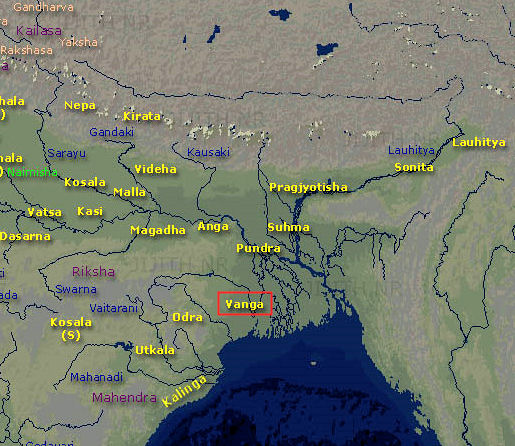
Abb.: वङ्गाः
[Source: JIJITH NR / Wikipedia. -- GNU FDLicense]
3. Becoming of one accord and forming a strong resolution not to desist
from the work undertaken, begin your business.एकचित्तो भूत्वारब्धात्कार्याद्विरामं न यस्यामीति दृढमतिं च कृत्वा कार्यमारभ्यताम् ॥३॥
4. A jackal, roaming at will near the precincts of a town, accidentally fell into an indigo vat, and being unable to get up, remained there, feigning himself to be dead.
कश्चिच्छृगालो नगरोपकण्ठे भ्रमन्यदृच्छया नीलीभाण्डे पतितः तस्माच्चोत्थातुमशक्नुवन्मृतवदात्मानं संदर्श्य स्थितः ॥४॥
{शृगालः = Canis aureus = Golden jackal}

Abb.: शृगालः = Canis aureus, Sariska
Tiger Reserve, Rajasthan (राजस्थान)
[Bildquelle: Digital.Knave. --
http://www.flickr.com/photos/digitalknave/344220065/. -- Downloaded on
2007-07-15. --
![]()
![]()
![]() Creative
Commons License (attribution, no commercial use, no derivative works)]
Creative
Commons License (attribution, no commercial use, no derivative works)]
{नीली = Indigofera tinctoria L. = true indigo}

Abb.: नीली =
Indigofera tinctoria L.
[Source: Kurt Stueber / Wikipedia. -- GNU FDLIcense]

Abb.: नीलीभाण्डम्
[Source: rickbradley. --
http://www.flickr.com/photos/rickbradley/4272048176/. -- Downloaded on
2010-04-07. --
Creative Commons License (attribution)]
5. The Brāhmaṇa, hearing the words of the rogue, placed the goat on the ground, looked at it again, and again, placed it once more on his shoulder, and took his way home, thinking over the rogues' words.
ब्राह्मणो धूर्तस्य वचनं श्रुत्वा छागं भूमौ निधाय तं पुनर्वीक्ष्य भूयो ऽपि स्कन्धे निधाय शठस्य वचनमनुध्यायन् or मनसा विभावयन् or चिन्तयन् गृहाभिमुखः प्रायात् ॥५॥
6. Then he was respectfully dismissed by the minister, having called him to court, honoured him with suitable presents, and communicated to him the message of the king.
ततो ऽमात्येन स नृपसदसमाहूयानुरूपैः पारितोषिकैः संभाव्य नृपस्य संदेशं चावेद्य (or श्रावयित्वा) सबहुमानं विसर्जितः ॥६॥
N. B.—Use Namul forms for the words italicized
7. He chose as many girls as he saw (दृश्) suitable to himself.
सो ऽनुरूपकन्यादर्शमवरयत् ॥७॥
8. He reduced (पिष्) the medicine to powder, and placing it on fire and boiling it, drank it up.
स औषधं चूर्णपेषमपिनट् तच्चाग्नौ निधायोत्क्वथ्यापिबत् ॥८॥

Abb.: सौषधं
चूर्णपेषमपिनट् ।
Kumarakom - കുമരകം, Kerala - കേരളം
[Source: BIJI KURIAN. --
http://www.flickr.com/photos/kruain/2554880555/. -- Downloaded on
2010-04-07. --
Creative Commons License (attribution, share alike)]
9. He was pelted to death (हन्) by the followers of the king for having killed their master.
तेषां स्वामिनं हतवान्स नृपानुचरैर्लोष्टघातं हतः ॥९॥
10. I fell upon my enemy all at once, and routing all his followers caught (ग्रह्) him alive.
अहं मम शत्रुमभिपत्य or अवस्कन्द्य तस्यानुचरान्विद्राव्य तं जीवग्राहमग्रहीषम् ॥१०॥
11. The king of Pāṭaliputra captured the town of Vasudurga, and took its inhabitants prisoners.
पाटलिपुत्रराजः वसुदुर्गं गृहीत्वा तद्वासिनो बन्दिग्राहमग्रहीत् ॥११॥
12. Who calls me by my name ?
को मां नामग्राहमाह्वयति ॥१२॥

Abb.: को मां दूरशब्देन
नामग्राहमाह्वयति ॥
[Source: Travel Aficionado. --
http://www.flickr.com/photos/travel_aficionado/2200003879/. -- Downloaded on
2010-04-07. --
Creative Commons License (attribution, no commercial use)]
To Lesson XVI.